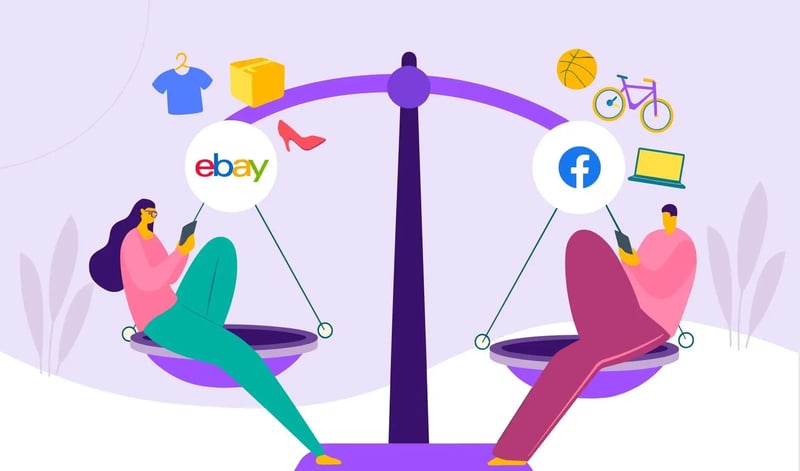If you’re trying to decide where to sell, the debate of Facebook Marketplace vs eBay comes up often. Both marketplaces offer unique advantages, but the right choice depends on your products, goals, and selling style. eBay provides sellers a massive audience, global reach, and advanced selling tools, while Facebook Marketplace makes it easy to move items locally and without fees. The short answer? eBay is better for niche items and reaching international buyers, while Facebook Marketplace is best for quick, fee-free sales in your local area.
Let’s dive deeper to see which platform is better for you. 👀
Main Takeaways
- eBay dominates when it comes to global reach, niche items, and seller protection.
- Facebook Marketplace shines for quick, fee-free local flips of bulky or everyday items.
- eBay fees range from 10–20%, but come with seller protections, analytics, and advanced tools.
- Facebook Marketplace is free for local sales, with low selling fees for shipped orders, but it offers fewer protections and less reliability.
- Ease of use favors Facebook Marketplace for beginners, while eBay has a steeper learning curve.
- Vendoo helps sellers win by crosslisting to both marketplaces in seconds, saving time and boosting exposure.
Overview of eBay

eBay is the world’s largest and most recognizable peer-to-peer e-commerce marketplace, connecting millions of buyers and sellers across the world. Originally launched in 1995 as an auction-style site for collectibles, it has since evolved into a full-scale e-commerce platform.
Today, eBay supports both auction-style bidding and fixed-price listings, making it a versatile marketplace for everything from secondhand goods and rare collectibles to brand-new retail products.
eBay Key Features:
- Auction and Buy It Now options
- Global customer base with over 134 million active users
- Seller tools for inventory, shipping, and promotions
- Buyer and seller protection policies
- Detailed analytics and performance dashboards
eBay Pros:
- Worldwide reach and global shipping
- Strong seller protections and dispute resolution
- Built-in shipping and payment integrations
- Advanced analytics and seller resources
eBay Cons:
- Robust, complex interface
- Fees range from 10 to 15% depending on the category
- Learning curve for optimizing listings
- Highly competitive in popular categories
eBay Is Best for:
- Collectibles like trading cards, comics, and vintage goods
- Fashion and apparel
- Electronics, gadgets, and small shippable items
- Sellers looking to scale into a global business
Learn more about eBay in the article How to Sell on eBay: A Guide for Beginners
Overview of Facebook Marketplace

Facebook Marketplace turns scrollers into shoppers with an integrated buying and selling opportunity on the popular social media app. Facebook Marketplace is a local-first selling platform built directly into Facebook.
It is like an online yard sale, allowing users to list items for sale to people nearby. The integration of shipping (available for select categories) has turned Facebook Marketplace into a more legitimate resale platform.
Facebook Marketplace Key Features:
- Integrated with Facebook accounts, offering instant audience exposure
- Local pickup is the primary transaction method
- Free to list items, no selling fees for local transactions
- Low selling fees for shipped orders
- Direct messaging between buyers and sellers
- Marketplace ads and boosting options for extra visibility
Facebook Marketplace Pros:
- Free for local sales (low fees for shipped sales)
- Extremely simple to list items in minutes
- Access to a built-in audience of Facebook users
- Great for bulky items that are impractical to ship
Facebook Marketplace Cons:
- Shipping isn’t available to all sellers or on all categories
- Higher risk of unreliable buyers
- Limited protections compared to eBay
- Not as effective for niche or collectible items
- Relies heavily on local demand
Facebook Marketplace is Best For:
- Furniture, appliances, and large household goods
- Quick local flips
- Beginners testing the resale market without upfront costs
Learn more in the article How to Sell on Facebook Marketplace: Key Tips for Success
eBay vs Facebook Marketplace at a Glance
|
eBay |
Facebook Marketplace |
|
|
Fees |
10-20% (plus promotional fees) |
No fees for local (10% on shipped) |
|
Audience Reach |
Global |
Local |
|
Ease of Use |
Moderate Learning Curve |
Beginner Friendly |
|
Product Types |
Wide Range |
Wide Range, Including Large/Bulky |
|
Safety/Trust |
Strong Protection and Dispute System |
Less Protection |
|
Shipping/Pickup |
Integrated Shipping Options |
Local Pick Up (Some shipping) |
|
Seller Tools |
Advanced, bulk listings, marketing |
Basic, relies on social visibility |
Fees
- eBay fees are highly complex and dependent upon a dozen factors, including eBay store subscription, seller status, selling category, payment method, and promotional fees. As a rough estimate, eBay fees are generally between 10% to 20% of the sale price.
To make things easy, you can use our eBay fee calculator. - Facebook Marketplace has no fees for local sales. When you arrange for a local meetup or pickup, there are no seller fees unless you use a payment processing app like Venmo or PayPal (payment processing fees apply). For orders that are shipped, Facebook Marketplace charges a 10% selling fee with a minimum of $0.80.
Similar to eBay, we also have a Facebook Marketplace fees calculator for you to use for free.
Audience Reach
- eBay’s reach is unparalleled, with millions of global shoppers. If you’re selling rare, niche, and collectible items, eBay provides the best exposure to the largest audience.
- Facebook Marketplace has a substantially smaller audience, limited to only shoppers with an active Facebook account. Often, users limit their search to only local sales, adding additional geographic limitations.
Ease of Use
- eBay is a complex marketplace with advanced seller tools that present a learning curve.
- Facebook Marketplace is a simple platform with intuitive, user-friendly features ideal for a beginner.
Product Types
While both eBay and Facebook Marketplace have expansive selling categories, certain items naturally perform better on one platform or the other:
- The best selling items on eBay include car parts, electronics, fashion and apparel, trading cards, sneakers, vintage collectibles
- Facebook Marketplace top-selling categories include furniture, appliances, kids’ items, and seasonal decor
Safety Trust
- eBay is safe and trusted. eBay provides seller and buyer protections, making transactions more secure. eBay also has authentication for luxury goods, built-in secure payments, and identity verification.
- Facebook Marketplace is riskier, since many sales involve cash and in-person meetups. To stay safe, sellers should meet buyers in public places or use Facebook’s payment system when available. Unfortunately, Facebook Marketplace sellers are more vulnerable to flaky or fraudulent buyers.
Shipping and Pickup
- eBay’s built-in shipping options make it easy to sell across the world. While the platform allows sales of large and bulky items (even cars), the responsibility for arranging shipping falls on the seller, and most individuals lack the knowledge or resources to handle that process.
- Facebook Marketplace is geared toward local pickups, which saves on shipping but limits reach. For bulky items, Marketplace is a clear winner.
Seller Tools
- eBay offers a wide range of advanced seller tools designed for both casual and professional sellers. Features include the eBay bulk listing tool, inventory management, analytics, shipping label integration, and promotional options like Promoted Listings. eBay also provides API integrations and compatibility with third-party software, making it easier for high-volume resellers and businesses to scale.
- Facebook Marketplace is a simple platform, providing only basic seller tools. Listings are created quickly through the Facebook app, but there are no advanced analytics, bulk listing features, or promotional tools. Sellers rely heavily on Facebook’s algorithm for visibility and direct communication with buyers through Messenger. This makes it convenient for casual selling but limited for those looking to run a serious reselling business.
Crosslist to eBay and Facebook Marketplace with Vendoo
eBay and Facebook Marketplace each have their pros and cons. Some shoppers use the eBay app but not Facebook, while others shop on Facebook but not eBay. To maximize sales, it’s best not to limit yourself to just one platform.
With Vendoo, you can crosslist inventory on both eBay and Facebook Marketplace, maximizing reach while saving time. Vendoo also helps manage inventory, provides photo-editing, bulk tools, automation, analytics, and more!
Real World Examples
Real-world examples show how different types of sellers use eBay and Facebook Marketplace to their advantage. Each platform serves unique purposes depending on the products being sold, the target audience, and the seller’s business goals.
Example 1: Vintage clothing reseller
A seller specializing in Y2K and vintage clothing uses eBay for the massive audience and advanced tools to promote their niche items to a global audience. Buyers from all around the United States and Europe consistently purchase their American vintage pieces, which would not be possible with Marketplace’s local limits.
Example 2: Furniture seller
A seller purchases furniture, restores it, and flips it locally on Facebook Marketplace. Items like sofas and dining sets move quickly without worrying about shipping logistics, and local meet-ups mean no selling fees!
Facebook Marketplace vs eBay: Why Choose Just One?
Both eBay and Facebook Marketplace bring undeniable strengths to the table. eBay opens the door to global buyers who pay top dollar for collectibles, electronics, and niche items, but it is a bit complex and advanced.
Facebook Marketplace delivers fast, fee-free local sales that are perfect for large and bulky items, but has a smaller reach. Choosing just one limits your potential. The real winning strategy is leveraging both.
With Vendoo, you can crosslist in seconds, expand your reach, and maximize profits, without any additional work! Don’t settle for less when you can sell smarter, faster, and more with Vendoo.
Facebook Marketplace vs eBay FAQs
What is the downside of selling on eBay?
The main downsides to eBay are the complex interface and the seller fees, which can take 10 to 20% of your profits.
What are the cons of selling on Facebook Marketplace?
FBMP cons include scams and unreliable buyers. There’s also limited protection, and niche items may not sell as well locally.
Is it cheaper to sell on Facebook Marketplace than eBay?
Yes. Facebook Marketplace is free for local sales, and selling fees are only 10% on shipped orders. While eBay charges fees on sales, it also provides a massive global audience, seller tools, and additional protections, which may justify the cost.
What are the main differences between selling on eBay vs Facebook Marketplace?
eBay is global, fee-based, and ideal for niche or shippable items. Facebook Marketplace is local, mostly free, and best for quick flips or bulky goods.







